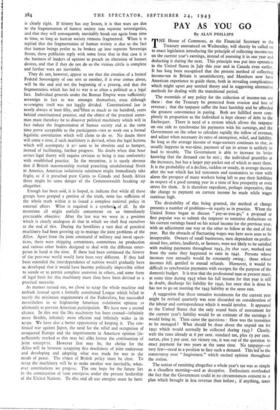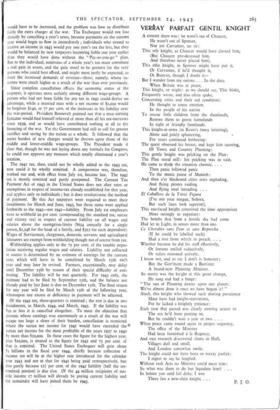PAY AS YOU GO
By ALAN PHILLIPS
THE House of Commons, as the Financial Secretary to the Treasury announced on Wednesday, will shortly be called on to enact legislation introducing the principle of collecting income-tax on the current year's earnings, instead of assessing it in one year and deducting it during the next. This principle was put into operation in the United States in July this year and in Canada even earlier. It has long been recognised that the present method of collecting income-tax in Britain is unsatisfactory, and Members now have American experience to guide them, both in revealing complications which might upset Any untried theory and in suggesting alternative methods for dealing with the transitional period.
The essentials of any policy for the collection of income-tax are these : that the Treasury be protected from evasion and loss of revenue ; that the taxpayer suffer the least hardship and be afforded the greatest convenience in paying. Both are fulfilled more com- pletely in proportion as the individual is kept clearer of debt to the Exchequer. There is need of a system which allows the taxpayer on one side to synchronise his payments with his earnings, and the Government on the other to calculate rapidly the inflow of revenue, and adjust when necessary its rates of exemption, relief, and liability. So long as the average income of wage-earners continues to rise, as usually happens in war-time, payment of tax in arrear is unlikely to lead to trouble. The Government is able to increase its levies knowing that the demand can be met ; the individual grumbles at the increases, but has a larger pay-packet out of which to meet them. It is the probability of a decline, sudden or steady, in average income after the war which has led statesmen and economists to view with alarm the prospect of many workers being left to pay their liabilities in respect of a good earning year in a time of less prosperity or even stress for them. It is therefore expedient, perhaps imperative, that the change to payment on current income be made while wages continue high.
The desirability of this being granted, the method of change presents a number of problems—in equity as in practice. When the United States began to discuss " pay-as-you-go," a proposal at first popular was to submit the taxpayer to tentative deductions on his current earnings based on his actual income for the previous year, with an adjustment one way or the other to follow at the end of the year. But the obstacle of fluctuating wages was here soon seen to be insuperable. Owners of small businesses, men dependent on profes- sional fees, artists, landlords, or farmers, were not likely to be satisfied with making payments throughout 1943, fot that year, worked out from the sums they happened to earn in 1942. Persons whose incomes rose annually would be constantly owing ; those whose incomes fell, ontitled to annual refunds. Moreover, it would be difficult to synchronise payments with receipts for the purpose of the domestic budget. It is true that the professional man at present must, at some time during 1943 when his full income for that year is still in doubt, discharge his liability for 1942, but once that is done he has not to go on meeting the 1943 liability at the same rate.
A suggestion that these tentative instalments for the current year might be revised quarterly was next discarded on consideration of the labour and correspondence which it would involve. It appeared to the United States that the only sound basis of assessment for the current year's liability would be an estimate of the earnings it would bring in. Then came the questions : How was the transition to be managed ? What should be done about the unpaid tax for 1942 which would normally be collected during 1943 ? Clearly, with the rates already at 6 per cent. standard tax, plus 13 per cent. surtax, plus 3 per cent. net victory tax, it was out of the question to exact payment for two years at the same time. No taxpayer—or very few—stood in a position to face such a demand. This led to the controversy over " forgiveness " which excited opinion throughout the nation.
The notion of remitting altogether a whole year's tax was as simple as a cloudless morning—and as deceptive. Enthusiasts overlooked the fact that the Government could in no circumstances consent to a plan which brought in less revenue than before ; if anything, taxes would have to be increased, and the problem was how to distribute fairly the extra charges of the war. The Exchequer would not lose directly by cancelling a year's taxes, because payments on the current year would begin to flow in immediately ; individuals who ceased to receive an income in 1943 would pay one year's tax the less, but they would be balanced by new taxpayers becoming liable one year earlier than they would have done without the " Pay-as-you-go " plan. But to the individual, remission of a whole year's tax must constitute a real gain in assets, and the gain stood to be greatest for the very persons who could best afford, and might most justly be expected, to meet the increased demands of revenue—those, namely, whose in- comes were much higher as a result of the war than ever previously.
Since complete cancellation affects the economic status of the taxpayer, it operates most unfairly among different wage-groups. A person who had not been liable for any tax in 1942 could. derive no advantage, while a married man with a net income of $2,000 would be forgiven $140, or 77 per cent. of the increases in his liability over the war-period. President Roosevelt pointed out that a man earning $100,000 would find himself relieved of more than all his tax-increases since 1939, and so would have contributed nothing at all to the financing of the war. Yet the Government had still to call for greater sacrifice and saving by the nation as a whole. It followed that the entire burden of new charges would be thrown upon those of the middle and lower-middle wage-groups. The President made it clear that, though he was not laying down any formula for Congress, he could not approve any measure which totally eliminated a year's taxation.
The 1942 tax, then, could not be wholly added to the 1943 tax, now could it be wholly remitted. A compromise was, therefore, worked out and, with effect from July 1st, became law. The 1942 tax is mostly remitted and partly postponed. The Current Tax Payment' Act of 1943 in the United States does not alter rates or exemptions in respect of income-tax already established for that year, and applies only to individuals ; but it does revolutionise the method of payment. By this Act taxpayers were required to meet their instalments for March and June, 1943, but those sums were applied forthwith to the 1943—not 1942—liability. From July 1st employers were to withhold 20 per cent. (compounding the standard tax, surtax and victory tax) in respect of current liability on all wages and salaries above the exemption-limits ($624 annually for a single person, $1,248 for the head of a family, and $312 for each dependant). Wages of Servicemen, clergymen, domestic servants and agricultural labourers are exempt from withholding though not of course from tax.
Withholding applies only to the 79 per cent. of the taxable popu- lation receiving regular wages and salaries. Liability not collected at source is determined by an estimate of earnings for the current year, which will have to be completed by March 15th each year and may later be revised. Farmers, exceptionally, may delay until December 15th by reason of their special difficulty of esti- mating. The liability will be met quarterly. For 1943 only, the estimate had to be filed by September 15th, and the balance not already paid by last June is due on December 15th. The final return for any year will be filed by March 15th of the following year, whereupon any excess or deficiency in payment will be adjusted.
Of the 1942 tax, three-quarters is remitted ; the rest is due in two instalments, in March, 1944, and March, 1945. If the liability was $50 or less it is cancelled altogether. To meet the objection that persons whose earnings rose enormously as a result of the war will escape too large a share of their burden, cancellation is restricted where the surtax net income for 1942 would have exceeded the 0 surtax net income for the most profitable of the years 1937 to 1940 by more than $20,000. In those cases the figure for the highest year, plus $2o,00o, is treated as the figure for 1942 and 75 per cent. of that is remitted. The United States Exchequer will gain about 53 billions in the fiscal year 1944, chiefly because collection of income tax will be at the higher rate introduced for the calendar year 1943 and not at that for 1942 being paid retrospectively, but also partly because 12/ per cent. of the 1942 liability (half the un- remitted portion) is due also. Of the 44 million recipients of tax- able income 17 million will already be paying current liability and the remainder will have joined them by 1945.



























 Previous page
Previous page